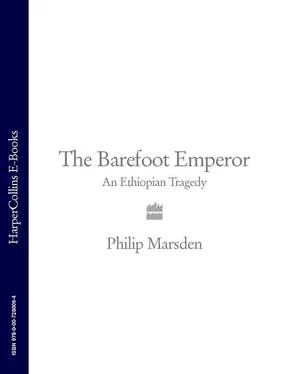In fact, he had already made his move. The very next day, Plowden received the news he had waited years for: from Shoa, Tewodros had suddenly marched his forces to Tigray. It was an astonishing feat. Only Tewodros could have achieved it. Six hundred miles through mountainous terrain in forty-odd days. With 60,000 men he had confronted Niguse. Niguse fled to the west. After five years, Tewodros had at last added Tigray to his realm. His territory now stretched from the Awash river in the south to the mountains above the Red Sea coast. It included Aksum, seat of the first Ethiopian empire. It revived for many the stalled hopes of Tewodros’s early years. Plowden was among them.
In Gondar, he hopped to his feet. He packed his belongings and prepared for the journey. He would see Tewodros in Tigray, then continue on to the coast. In Britain he could have his leg set properly and, with Tewodros’s new strategic advantage, present his case for the first time in person to the Foreign Office. Raised up onto a mule, he was escorted out of Gondar.
His small party was crossing the River Keha when a group of four hundred men attacked them. They were led by Gared, a nephew of Tewodros but a follower of Niguse. Plowden’s side was pierced by a spear. He died nine days later.
Later that year, Tewodros avenged the death of his old friend. He drew Gared into battle at Debarek. It was Yohannis, John Bell – in the uniform of the liqemekwas – who spotted Gared and shot him dead. But as he fired his pistol, Gared’s brother killed Bell, and was himself killed by Tewodros.
Tewodros knelt beside the body of John Bell. First Tewabach, then Plowden, and now Bell.
‘Yohannis! Poor Yohannis,’ he wept. ‘You saved my life, but at the expense of your own.’
Witnesses saw him sit there for some moments, overcome by grief. Suddenly he rose. He leapt onto the fallen figure of Bell’s killer, thrusting his spear again and again into the corpse’s head. ‘You wretch, you have taken from me my best friend, my only friend!’
Some months later, a visiting missionary showed the emperor a ‘stereoscopic image’. It showed a soldier weeping at the grave of friends fallen in recent fighting at Melegnano. When Tewodros saw the picture, he gazed at it a long time.
‘Let me also weep,’ he told the missionary, ‘for I have lost my best friends.’
Tewodros at the Gefat foundry, from a mural in the bar of the Hotel Tewodros, Debre Tabor
14
One of the first letters Tewodros sent after his coronation in 1855 was to Samuel Gobat, Anglican bishop of Jerusalem. Gobat had been a missionary in Ethiopia some twenty years earlier, but had been forced out by the country’s paralysing instability. Like others, he had watched the emergence of Tewodros and felt the chance had come again – not for him, but for a new generation of evangelical workers.
Tewodros, however, was asking him for artisans and craftsmen. He certainly did not want priests. ‘You know the situation of our country. It is where you lived. It has been divided, one against another, even into three. Now, by the power of God, I have unified it, so now let not priests who disrupt the faith come to me … of workers, let one who ploughs with a fire-wheel come, bringing the engine with him to me. I have heard people say that it exists.’
Eight months later, Samuel Gobat stood before the Anglican congregation on Mount Zion in Jerusalem. Seven fresh-faced, Swiss-trained missionaries gazed up at him.
‘Beloved brethren,’ he began, ‘the hour has come for which you have for some years been preparing yourselves, the hour for parting with the Christians in whose circle your spiritual life has been developed.’
The bishop was a solid and portly man. A great bib of a white beard hung down his chest. In his address, he drew on his own experience in the field years earlier.
‘Now, you will have to lean on the Lord in your weakness, in a land that is covered with darkness, and among a people who are still in the shadow of death. If you have ever felt and understood your infinite weakness and helplessness, as every one must into whose soul a ray from the Sun of Righteousness has penetrated, you must increasingly feel it in this solemn hour, as you see before you the difficulties of the journey and the deep degradation of the people to whom you are going …’
But with their own deviant version of Christianity, the Ethiopians were a people not entirely without redemption.
‘According to the ideas of the present king, who himself reads the Bible in his own language, and according to the practice of the Abune Selama, I do not think you will have any obstacle in spreading the Word of God. Judging by my own experience, I believe that many an Abyssinian will receive the Bible with thankfulness.’
He did warn them of the ambiguity that lay behind their mission.
‘Do not put to the king direct questions, so as to get decisive answers, as to whether you may settle in his country as messengers of salvation. The better plan will be not to bring the matter forward, nor seem anxious about it, but try first to persuade and convince the king through your behaviour, that you are true Christians who are led by the Spirit and the Word of God.’
Gobat believed that in Africa a great new world of evangelism was opening up. He and his committee planned an ‘Apostelstrasse’, a series of twelve stations between Egypt and Ethiopia which would help supply the Ethiopian mission, as well as radiating the Word of God from each station.
‘The field that lies desert before you, and must be worked and turned into a garden of God, is a wide, almost immeasurable field. It not only includes all Abyssinia, but the neighbouring heathenish Galla tribes, and the whole centre of Africa, of which Abyssinia is only the entrance. There the devil has his kingdom, and for thousands of years it has been allowed to go on quietly and undisturbed beneath his government.’
He concluded by reminding them that they were invited as artisans, and that their missionary activity should be covert.
‘You may feel it strange and disagreeable to hear that instead of preaching and baptising you are asked to work with your hands, and partly to earn your own living. The devil will whisper to you, and your own hearts will answer him loudly enough: “Work and earn our bread, live and die, we could have done in Germany, without the long preparation, and without going to wild Abyssinia.”’
Three of the men were so alarmed by Gobat’s portrait of wild Abyssinia that they pulled out. Among the others there were reservations. Only two out of the seven – Mayer and Kienzlen – set off for Ethiopia with anything approaching enthusiasm.
15
For a few years the mission ran smoothly. Tewodros was too busy campaigning to pay the missionaries much attention. But in 1858 he asked them to treat the dying Tewabach, and though they could do nothing, it marked the beginning of a closer relationship. As his own clergy revealed themselves to him as hidebound fools, so Tewodros took to spending time with the south German Pietists, and developed a respect for their brand of unadorned faith. They in turn overlooked his brutal sorties against the Oromo, and came to admire him.
‘He is,’ wrote Kienzlen, ‘the only man in Abyssinia who possesses the fear of God.’
In 1859, a new missionary arrived – Theophilus Waldmeier, a young Swiss of deep humility and an almost saintly gentleness. Tewodros always had favourites among the foreigners, and as the years passed Waldmeier came to fill the gap left by John Bell.
Theophilus Waldmeier had had a strict Catholic upbringing. As a boy he soon realised that ‘the priest is a bigger sinner than other people’. His grandmother beat him with a stick for saying so and he ran away from home. He rejected Catholicism and ended up at missionary school, at the famous St Chrischona College. There Samuel Gobat came and selected him for service in Ethiopia.
Читать дальше












